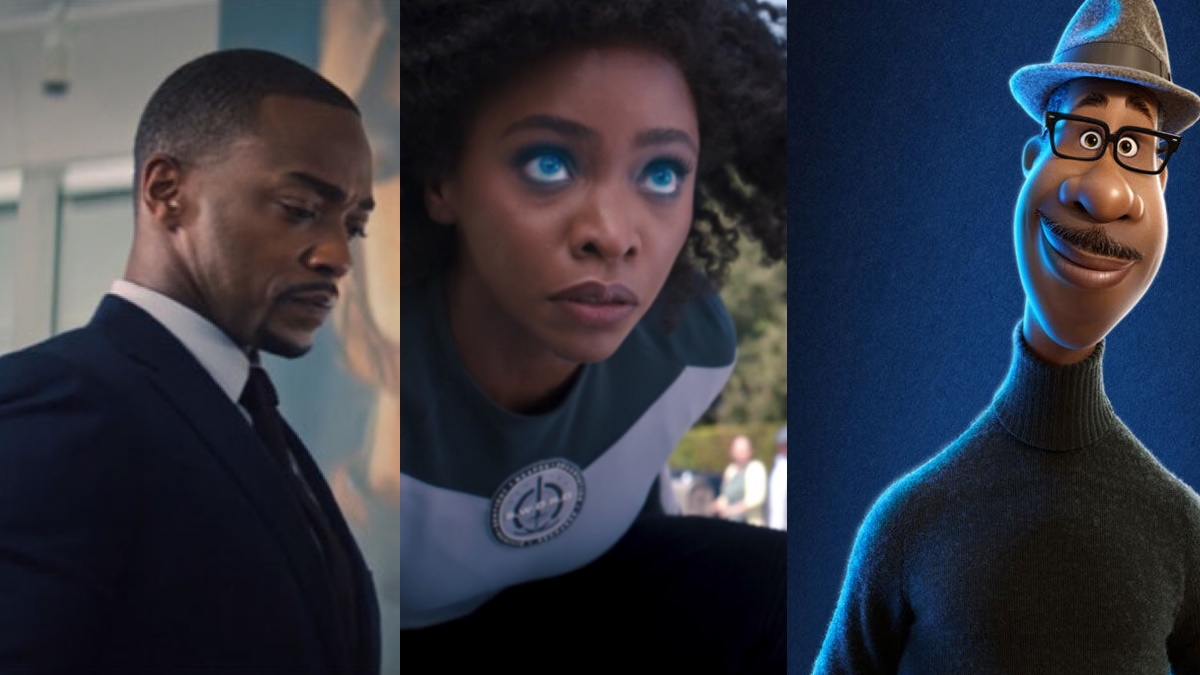Marginalized Audiences Are Allowed to Have Differing Opinions on Stories That Focus on Them and Their Experiences
We are not a monolith

A couple of weeks into The Falcon and the Winter Soldier I noticed that there was a divide amongst Black viewers on whether or not they liked the direction the series was going in.
I took one look at the discourse and said to myself, “Well that’s normal, of course, we aren’t all gonna agree.”
But for some reason, some folks were surprised that TFATWS wasn’t a unanimously hailed series by Black Marvel fans. The assumption seemed to be that we’d all be satisfied throughout the entirety of the series and have no issues with it because, well, it had a Black character as a lead and offered social commentary on his experience, along with the experiences of groups we could relate to.
That’s when I realized that I’d seen this happen before.
The discourse with Disney/Pixar’s Soul last year had a similar tone to it. People expected Black viewers to offer overwhelming praise, then were shocked to see the divided opinion of the film. White and non-Black viewers would talk down to Black folks who didn’t have heartwarming messages about the film. This even included Black viewers who said that they understood what the film was trying to do and understood how some took great meaning out of it, it just didn’t work for them personally.
None of that mattered, the general consensus, if you were Black, was you either bawled your eyes out over Soul or you were a hater.
The same thing happened with Lovecraft Country.
The same thing happened with how Monica Rambeau was handled in WandaVision.
Honestly, the same thing continues to happen with stories that claim to represent marginalized groups. I haven’t even mentioned the LGBTQ+ stories this has happened with, last year’s Happiest Season having all kinds of “fainting dramatically over a couch” reactions when folks realized that not every Festive for the Holidays Gay liked it, leading to divided opinions throughout the community.
Unless if a story is a flaming dumpster fire like Sia’s abysmal Music and its dreadful handling of autism, the assumption is that the reception from marginalized audiences MUST be overwhelmingly positive with no room for criticism—even if criticism, especially from the group creators are trying to represent, is KEY to getting better at telling their stories. It’s a frustrating assumption that we HAVE to like everything that’s got a marginalized character, that we can’t have differing opinions on what we’re given EVEN IF it is, supposedly, made for us.
And really, it shouldn’t take widespread community backlash that points to actually dangerous misconceptions about them for folks outside the community to say, “Okay, I get why you don’t like this.” The overall response I saw from Black audiences when it came to Them, for example, was that we didn’t wanna see ourselves brutalized in such a way when we live in a world that’s becoming used to mass shootings and police brutality toward Black communities. TFATWS, however, is more divided, because it’s not SO blatant with the aggression toward us. This means we have time to really process what’s going on in the story instead of having an immediate reaction of, “So there’s rape AND infanticide in the SAME SCENE?!”
When it comes to stories like TFATWS or Soul or Happiest Season, stories where there’s breathing room for differing opinions because the marginalized group in question isn’t being harmed to absurd levels, there’s head-scratching about us, well, not always agreeing. It’s understood that audiences dubbed as being “the majority” can have differing opinions on media, but marginalized groups aren’t afforded that same courtesy.
It doesn’t really let marginalized audiences BE an audience, it turns them into this odd consensus group where they all have to agree on whatever media they’re engaging in.
Sometimes, our opinions are gonna differ with these stories that aren’t high key triggering, and they should differ, because marginalized communities are made up of a variety of people with different lived experienced, so we’re ALL gonna have a different takeaway with these stories. What I perceive as positive representation can be seen as a negative to someone else within my community, and vice versa.
Furthermore, there are times where a marginalized person might not share the same critique because they aren’t there yet when it comes to representation. Had I see Happiest Season back when I first came out, for example, I would’ve adored it, clung to the holiday message of family and acceptance, and recommended my fellow baby gays to watch it. However, it came out at a point in my life where I want storytelling that doesn’t center on a woman who tells her partner to closet herself WHILE they are traveling to her parents’ house—among the other issues I had with the movie.
What also needs to be understood is that, sometimes, a marginalized person goes into a story for the sheer purpose of turning their brain off. It might be a series that misses the mark representation-wise, but that person is only there for the PEW PEW lasers and that’s it. I think we all have a media property with marginalized characters where we’re just there to have fun. That doesn’t mean critiques of how it portrays marginalized groups aren’t valid, hell, we probably AGREE with them, but sometimes we’re just there for silly fun times.
There are a variety of reasons for differing opinions, because, well, people HAVE differing opinions.
So when you see these marginalized communities—and the intersections of them—having a different opinion on that wildly popular marginalized story or character, just accept that, sometimes, it really do be like that.
(Image: Marvel/Disney)
Want more stories like this? Become a subscriber and support the site!
—The Mary Sue has a strict comment policy that forbids, but is not limited to, personal insults toward anyone, hate speech, and trolling.—
Have a tip we should know? tips@themarysue.com